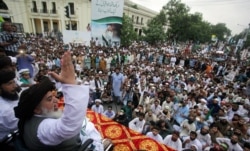Anjana Pasricha contributed to this report.
India eased restrictions Friday in Kashmir to allow the Muslim-majority population to attend Friday prayers, but protests still broke out in the disputed region.
Kashmir has been in an unprecedented five-day lockdown, depriving the region of any communications access, since India's government announced it was revoking Kashmir's special constitutional status.
Officials in Kashmir said residents in Srinagar were allowed to pray Friday at area-specific mosques.
Witnesses in the city's Soura area said a large group of people tried to start a protest but were pushed back by security forces who used tear gas and pellets.
A police officer, who requested anonymity since he was not authorized to speak to reporters, told the Reuters news agency that 12 people were taken to a hospital with pellet injuries. He put the number of people trying to protest at 10,000.
Mosque off limits
Authorities in Kashmir did not allow residents to congregate at Srinagar's historic Jama Masjid mosque, which usually draws thousands of people each week and is a longtime focus for separatist protests.
In Islamabad, Pakistan, thousands of protesters marched against India's move to scrap Kashmir's special status and bring it under tighter control by New Delhi.
Also Friday, China said it was "seriously concerned" about India's decision as Pakistani Foreign Minister Shah Mehmood Qureshi met in Beijing with his Chinese counterpart, Wang Yi, over the issue.
"China will continue to firmly support the Pakistan side in safeguarding its legitimate rights," said a Chinese Foreign Ministry statement issued after the meeting.
'New era'
On Thursday, Indian Prime Minister Narendra Modi promised Kashmiris the beginning of a "new era." In an address on television and radio, Modi defended revoking the constitutional provision under which Kashmir could make its own laws, saying it had impeded its progress, given rise to terrorism and was used as a weapon by rival Pakistan to "instigate some people." India would now rid the region of "terrorism and terrorists," he said.
Pakistan, which also claims Kashmir, has protested the move, downgrading its diplomatic ties with India and suspending trade.
Rebels in Kashmir have been fighting New Delhi's rule in the region for decades, and most Kashmiri residents want either independence or a merger with Pakistan.
New Delhi blames Islamabad for fomenting a violent three-decade separatist insurgency in the Himalayan region.







